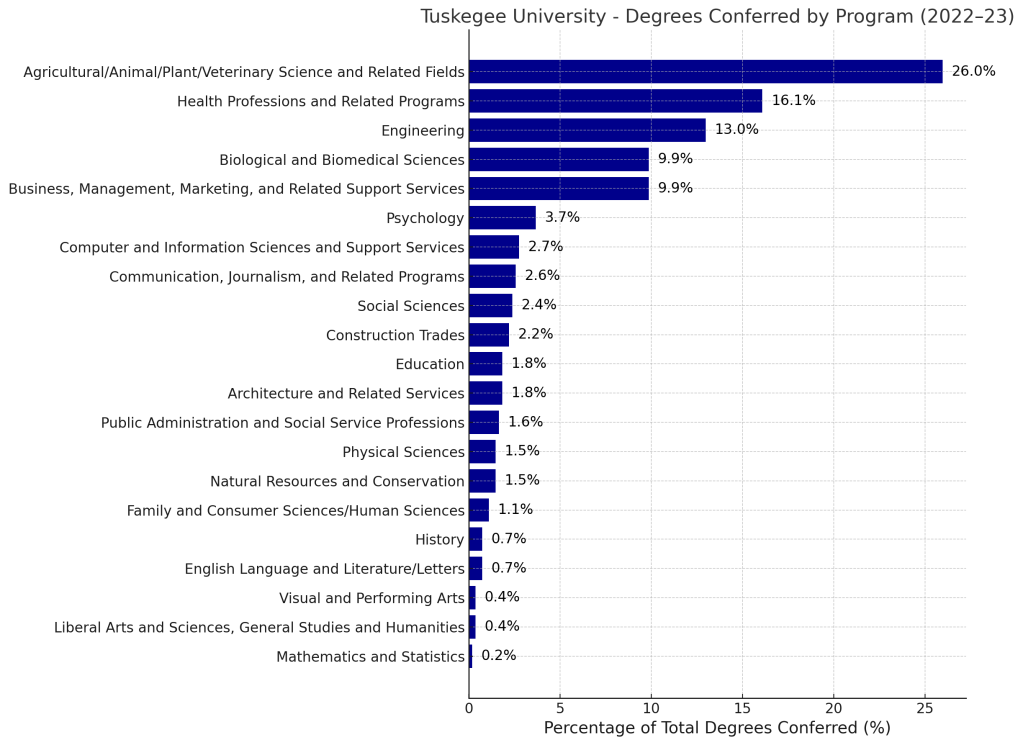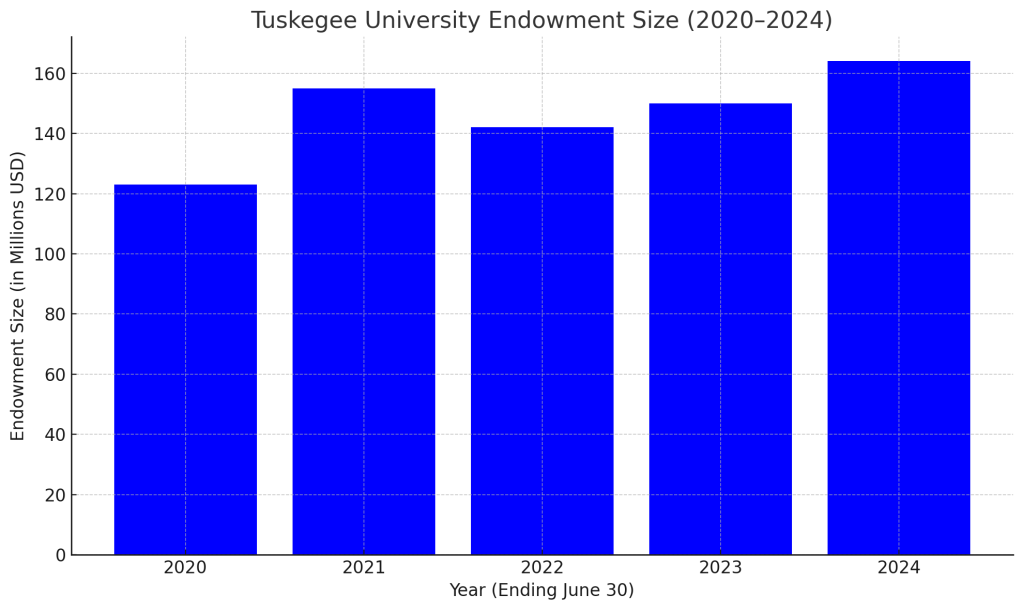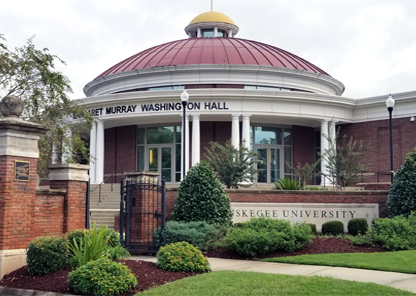April 14, 2025, by Dean Hoke: This profile of Tuskegee University is the ninth in a series presenting small colleges throughout the United States.
Background
Founded in 1881 by educator Booker T. Washington, Tuskegee University is a private historically black university (HBCU) located in Tuskegee, Alabama – about 40 miles east of Montgomery . Established initially as the Tuskegee Normal School for training Black teachers, it evolved into Tuskegee Institute and eventually a university known for blending liberal arts, technical, and professional education. The university’s campus, a designated National Historic Site, spans roughly 5,000 acres (including a 450-acre main campus and extensive forestry and research lands). Tuskegee is consistently ranked among the top HBCUs nationally (U.S. News #3 in 2023) and is noted for its academic rigor and legacy of producing African American leaders.
Curricula
Tuskegee offers a broad curriculum encompassing over 50 degree programs. Programs include Engineering, Architecture, Business, Education, and Nursing & Allied Health, as well as a renowned College of Veterinary Medicine. The university balances a liberal arts foundation with strong STEM and professional programs. Students complete a liberal arts core while pursuing majors in fields like engineering, agriculture, the sciences, business, and the humanities. Tuskegee has introduced distinctive programs that leverage its heritage – for example, it hosts the nation’s only Aerospace Engineering program at an HBCU, and it houses a National Center for Bioethics in Research and Health Care focused on minority health ethics.
Experiential learning is integral: from engineering design projects to agricultural research and Cooperative Extension outreach in rural communities, students get hands-on training. Notably, Tuskegee’s veterinary medicine program, founded in 1945, provides crucial clinical experience and has become a top producer of minority veterinarians. Outcomes for graduates are strong in many programs – for example, nursing and allied health majors benefit from clinical partnerships, and engineering students often secure competitive internships. Tuskegee reports in 2022, the four-year graduation rate is 33%, and the six-year graduation rate is 67%.
Strengths
- Historic Legacy and Mission: Tuskegee’s history is a cornerstone of its identity. It was built on Booker T. Washington’s self-help philosophy and has played a pivotal role in African American education for over a century.
- Excellence in STEM, Agriculture, and Veterinary Medicine: The university is a powerhouse in STEM fields. It is the only independent HBCU with four ABET-accredited engineering programs and the only HBCU with an Aerospace Science Engineering program. Its College of Veterinary Medicine has educated over 70% of African American veterinarians in the United States.
- Strong Student Outcomes and Recognition: Tuskegee is recognized for improving social mobility and student success. U.S. News ranks Tuskegee #1 among Southern schools for social mobility and among the top 5 HBCUs nationwide. The university has produced generations of leaders and pioneers, which bolsters its reputation and provides current students with role models and mentors.
- Community Engagement and Service: As a land-grant institution, Tuskegee is deeply committed to community service and outreach. Through its Cooperative Extension Program and initiatives like the new Center for Rural Health and Economic Equity, the university addresses needs in Alabama’s Black Belt region—from agricultural assistance for local farmers to health equity research for underserved rural populations.
Weaknesses
- Enrollment Decline: Tuskegee’s Full-Time Equivalent (FTE) enrollment has steadily decreased from 3,276 in 2019 to a low of 2,755 in 2023, with a modest rebound to 2,881 in 2024. This downward trend, though not unique among small institutions, negatively impacts tuition revenue, national rankings, and institutional perception.
- Infrastructure and Facilities: Numerous campus buildings require modernization. Students and alumni on platforms like UNIGO have expressed concerns about aging dormitories and outdated lab and classroom technology. These issues pose challenges for student recruitment and retention, especially in STEM disciplines. The university acknowledged these concerns in 2024 and stated that actions are underway to address construction delays.
- Return on Investment (ROI): According to Georgetown University’s Center on Education and the Workforce, Tuskegee’s 40-year ROI for bachelor’s degrees is $1,434,000—well below the national average of $1,744,000 for private institutions. This places Tuskegee in the lower 20th percentile nationally and may raise concerns among prospective students and families weighing the long-term value of a Tuskegee degree.
Note: Tuskegee does an exceptional job with the students it serves, often outperforming peers in helping students succeed and move up economically. However, its graduates’ average earnings are lower than those of graduates from many other private institutions, which affects ROI rankings. This contrast is common among mission-driven institutions that serve high-need populations and public interest-oriented fields (e.g., education, social work, veterinary medicine), where average salaries tend to be lower despite high societal value.
Economic Impact
Tuskegee University is a major economic engine for its region. According to the United Negro College Fund’s (UNCF) 2024 Economic Impact Report, Tuskegee University contributes approximately $237.1 million annually to Alabama’s economy and supports 2,064 jobs statewide through its operations, payroll, student spending, and visitor expenditures. It is one of the largest employers in Macon County, with nearly 1,400 employees on payroll, and its presence stimulates additional employment in the community (restaurants, shops, services that cater to students and employees).
Beyond direct spending, as a land-grant institution, it operates Cooperative Extension programs that improve agricultural productivity and entrepreneurship in rural Alabama. The university actively pursues research grants that address local needs. For example, in 2023, Tuskegee received a $2.2 million federal grant to establish a Center for Rural Health and Economic Equity, which will not only improve healthcare outcomes in Black Belt counties but also create research jobs and community health worker positions.
Enrollment Trends
As of Fall 2024, total enrollment (FTE) is 2881 students, including undergraduates, graduate students, and professional students in veterinary medicine.
The university has actively recruited beyond Alabama: currently, only 26% of undergraduates are Alabama residents, while 74% come from out-of-state.
Degrees Awarded by Major
In the 2022–23 academic year, Tuskegee University conferred 547 degrees in total (410 bachelor’s, 69 master’s, and 68 doctorates, including professional degrees).

Alumni
Tuskegee University boasts a vibrant alumni network of tens of thousands of graduates spread across the U.S. and abroad. With nearly 140 years of history, Tuskegee has produced generations of African American professionals and leaders, creating an expansive community often referred to as the “Tuskegee Family.” Alumni remain closely connected to the university and each other.
Notable Alumni and Figures: Tuskegee’s alumni and associated figures include some of the most influential names in U.S. education, science, military, and culture:
- Amelia Boynton Robinson (Class of 1927): Pioneering civil rights activist and leader in the voting rights movement. She played a key role in the 1965 Selma to Montgomery marches, inviting Dr. Martin Luther King Jr. to Selma.
- Gen. Daniel “Chappie” James (Class of 1942): The first African American four-star general in U.S. military history.
- Lonnie Johnson (Class of 1973): Engineer and inventor, Johnson, a Tuskegee mechanical engineering graduate, had a distinguished career at the Air Force and NASA before his entrepreneurial success. He holds over 100 patents.
- Lionel Richie (Class of 1974): Grammy-winning singer, songwriter, and former lead vocalist of the Commodores. Richie, a Tuskegee native, graduated with an economics degree.
- Keenen Ivory Wayans (Attended from 1977-1980): an American actor, comedian, director, and filmmaker who co-hosted and created the TV comedy Emmy award show In Living Color. An engineering student on scholarship, he left Tuskegee in his senior year to pursue acting.
Endowment and Financial Standing
Tuskegee University’s financial foundation is solid but underpins a careful stewardship to meet institutional needs. As of 2024, the university’s endowment is valued at around $161 million. It remains smaller than some peer HBCUs. The university still depends heavily on tuition and fees. A milestone came in 2020 when philanthropist MacKenzie Scott donated $20 million to Tuskegee – the largest gift in the university’s history.

The university’s financial management has earned positive marks. The 2023 Forbes Financial Grades gives Tuskegee a 3.82 GPA and a letter grade of A-.
Why is Tuskegee Important?
- Tuskegee University holds a singular place in American higher education and society, with a legacy and ongoing impact that extend far beyond its small-town Alabama campus. Founded in an era of segregation and limited opportunities for Black Americans, Tuskegee became a beacon of self-determination – educating Black teachers, farmers, and craftsmen in its early years and proving that excellence could flourish under the most challenging conditions.
- Tuskegee’s importance also lies in its academic and professional contributions, particularly in increasing diversity in critical fields. It has been a prolific producer of African American professionals: for example, as noted, the vast majority of Black veterinarians are Tuskegee graduates, and the university has trained countless Black engineers, nurses, and scientists.
- Tuskegee University remains a cultural touchstone and symbol of excellence. Tuskegee has also influenced educational models worldwide; notably, its extension work and vocational training approaches were emulated in developing nations (especially in Africa) during the 20th century, spreading the ethos of education for empowerment globally.
In summary, Tuskegee University is important because it represents the power of education as a force for equality and innovation. It has transformed lives and communities for generations, contributed richly to African American history and American progress, and continues to produce leaders and ideas that shape our world. In American higher education, Tuskegee’s thread is unique and invaluable – an embodiment of resilience, excellence, and the ongoing pursuit of knowledge for the betterment of society.
Dean Hoke is Managing Partner of Edu Alliance Group, a higher education consultancy, and a Senior Fellow with the Sagamore Institute. He formerly served as President/CEO of the American Association of University Administrators (AAUA). With decades of experience in higher education leadership, consulting, and institutional strategy, he brings a wealth of knowledge on small colleges’ challenges and opportunities. Dean, along with Kent Barnds, is a co-host for the podcast series Small College America.

